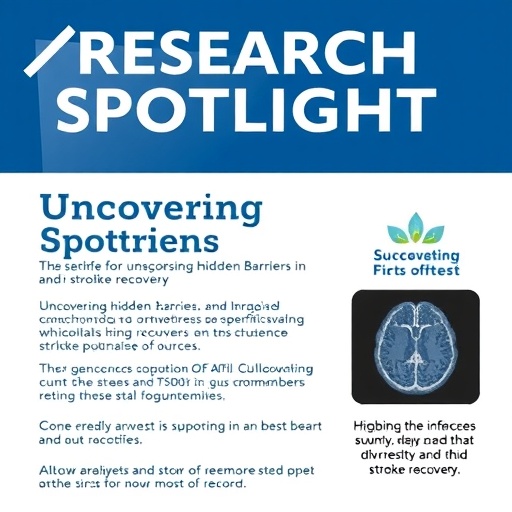In a groundbreaking study led by Dr. Nirupama Yechoor at Massachusetts General Hospital, new light has been shed on the complexities of stroke recovery, emphasizing the vital role of emotional and social wellbeing alongside physical rehabilitation. The research, published in JAMA Network Open, bridges a crucial gap in our understanding of stroke survivors’ lived experiences and challenges longstanding assumptions about recovery metrics and care strategies.
Stroke, a leading cause of long-term disability worldwide, traditionally centers medical intervention on physical rehabilitation—restoring movement, strength, and neurological function. However, Dr. Yechoor and her team highlight profound emotional and psychosocial dimensions that are often sidelined in clinical practice. By using qualitative research methods, the study delves deep into the narratives of 41 stroke survivors and their caregivers across the United States, collected between October 2023 and December 2024. This approach offers an intimate perspective on the multi-layered journey of recovery that transcends just physical healing.
The central aim of the research was to dissect the elements constituting both physical and emotional wellbeing post-stroke, then evaluate how well these dimensions align with existing clinical assessment tools. Specifically, they contrasted survivors’ self-reported experiences with the Stroke Specific Quality of Life (SSQoL) scale—an instrument ubiquitous in stroke research and clinical monitoring. The comparison revealed striking insights into what aspects of recovery are well-measured and, more importantly, which critical emotional components remain unaddressed.
Stroke survivors articulated that beyond the pursuit of regaining physical mobility, emotional recovery holds equal, if not greater, significance. They reported dealing with pervasive feelings of stigma, uncertainty about their future, loss of identity, and diminished social participation. These emotional burdens manifest as a constellation of five key factors challenging recovery: loss of independence, fear stemming from unpredictability, restricted community engagement, pervasive shame, and decreased physical mobility. While the SSQoL scale effectively captures elements related to physical functioning and social participation, it inadequately reflects the nuanced emotional states of shame and uncertainty.
This revelation underscores a significant care gap in the post-stroke continuum. Traditional care models predominantly target neurological and physical restoration, often neglecting the intangible yet profound psychological hurdles that survivors encounter daily. Addressing this gap requires a paradigm shift: clinicians and researchers must incorporate the lived experiences of stroke survivors more holistically into both assessment and therapy frameworks.
The study’s implications extend beyond measurement inadequacies to the broader development of stroke rehabilitation models. Partnering with stroke survivors and caregivers, Dr. Yechoor’s team advocates for patient-centered care pathways that prioritize emotional resilience and psychological health on par with physical recovery. This inclusive model would involve creating interventions co-designed by patients, enhancing relatability and efficacy.
Looking forward, the research group plans to translate their qualitative insights into actionable clinical interventions. An essential aspect of this next phase is the integration of patient and caregiver perspectives during intervention design, ensuring that new therapeutic approaches resonate with the priorities and lived realities of those recovering from stroke. This method rests on the principle that understanding a patient’s holistic experience, rather than exclusively focusing on clinical metrics, leads to more meaningful and sustained recovery outcomes.
Crucially, the study contributes to shifting the scientific discourse in stroke research. It challenges researchers to rethink how recovery is defined and measured, advocating for multidimensional metrics that encompass physical, emotional, and social domains. The recognition of emotional wellbeing as a cornerstone of stroke rehabilitation encourages multidisciplinary collaboration, including neurologists, psychologists, social workers, and rehabilitation therapists, to craft integrated care models.
The authors acknowledge the critical role of stroke survivors and their caregivers who participated in the research. Their candid narratives and resilience not only enriched the data quality but also serve as a clarion call to healthcare systems to prioritize comprehensive recovery. Their partnership exemplifies how patient engagement can dramatically enhance research relevance and clinical impact.
This innovative work was made possible with support from the Bugher Collaborative Project and various brain health innovation funds, highlighting the growing emphasis on neurological research that goes beyond the biological underpinnings to embrace psychosocial complexity. The authors’ affiliations and disclosures indicate a robust network of collaboration spanning major research institutes, reflecting the study’s credibility and scientific rigor.
Dr. Yechoor’s study represents a paradigm transformation in stroke care, one that aligns recovery with real human experience rather than narrowly defined clinical outcomes. By bringing emotional health to the forefront of stroke recovery dialogue, this research paves the way for developing more compassionate, effective, and personalized therapeutic approaches that could ultimately improve quality of life for millions of stroke survivors worldwide.
As the healthcare community digests these findings, there is hope that new comprehensive stroke care models will emerge that are better attuned to the needs of survivors. The continued partnership between patients, caregivers, and clinicians will be vital to this evolution, ensuring that future research and interventions address the full spectrum of recovery.
This study not only advances scientific understanding but also elevates the voices of stroke survivors, reminding the field that successful recovery is a multifaceted, deeply personal journey. Recognizing and incorporating these voices fosters a much-needed humanistic approach in neurology and rehabilitation medicine, underscoring the importance of empathy, inclusivity, and holistic care.
Subject of Research: People
Article Title: “Coherence of Stroke Survivors’ Lived Experiences and the Stroke Specific Quality of Life Scale”
News Publication Date: 17-Oct-2025
Web References: DOI: 10.1001/jamanetworkopen.2025.3795
References: Choksi, D., et al. “Coherence of Stroke Survivors’ Lived Experiences and the Stroke Specific Quality of Life Scale” JAMA Network Open. DOI: 10.1001/jamanetworkopen.2025.3795
Image Credits: Not provided
Keywords: cerebrovascular disorders, stroke recovery, emotional wellbeing, quality of life, stroke specific quality of life scale, patient-centered care, rehabilitation, caregiver support, neurological disorders
Tags: bridging gaps in stroke carecaregiver experiences in stroke recoveryemotional wellbeing in stroke survivorsholistic stroke recovery strategiesJAMA Network Open researchlong-term disability and strokeMassachusetts General Hospital studypsychosocial factors in rehabilitationqualitative research in healthcareSSQoL scale evaluationstroke recovery barriersstroke survivor narratives





